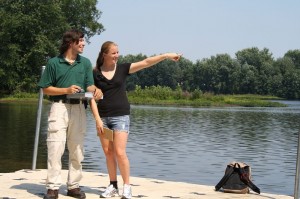By Jessica Rafalko
Contributing Writer
 This semester marks the first time University students have the option to participate in the Bucknell on the Susquehanna study abroad program.
This semester marks the first time University students have the option to participate in the Bucknell on the Susquehanna study abroad program.
Billed as a “domestic study abroad program,” Bucknell on the Susquehanna gives students the opportunity to study the region’s largest river and chief supplier of freshwater for the Chesapeake Bay.
Professor Craig Kochel, associate professor Matthew McTammany and associate professor Peter Wilshusen head the program.
Bucknell on the Susquehanna functions similarly to a foreign study abroad program. For one semester, students take four courses, taught collaboratively between the three instructors, and have a variety of hands-on opportunities with the river and surrounding areas. The curriculum is concentrated mostly on “interrelationships between natural science, society and culture” Kochel said.
Funded by a grant from the Henry Luce Foundation, the program has been years in the making. Wilshusen attributes the development of the program to work done at the Environmental Center through the Susquehanna River Initiative. The SRI’s website lists “natural history, conservation, [and] restoration” among its aims.
Though the structure of Bucknell on the Susquehanna is unique to the University, domestic study abroad programs are common throughout the nation. A number of college campuses, through the National Student Exchange, send students to other North American campuses annually. Those who cannot commit to an international exchange program can spend a semester at a participating campus in the continental United States, Canada, or a number of American island territories.
Programs like NSE are often more economically feasible, and less culturally jarring than traditional study abroad programs.
While studying a local river may not seem as worldly an experience as the other international programs offered by the University, participants of Bucknell on the Susquehanna are focusing on issues of great significance—nationally as well as locally.
Wilshusen expresses anticipation for an upcoming trip to the West Coast to compare attitudes and practices toward the environment on either side of the country. Students also meet with “key actors,” who are involved with the river either through the state or independently.
Participants live near one another on campus to foster a sense of community.
The program strives to provide a feel similar to what one might experience in a more traditional study abroad program. The Susquehanna River serves as a gateway for students, allowing them to engage with the world at large.
Some students would prefer to travel abroad rather than stay in Lewisburg for their “semester abroad.”
“I’d rather go to Europe,” Emily Shoemaker ’14 said.
“I really want to get the experience of somewhere else,” Mary Matthews ’12



